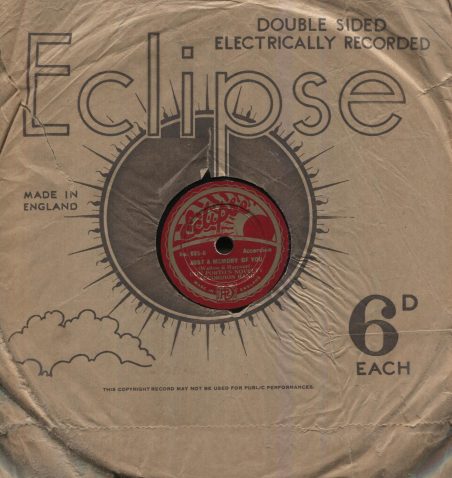
“In The Days That Used To Be”
Don Porto’s Novelty Accordion Band; Fred Latham, vocal
(Eclipse 832-B) 1934
“Just A Memory Of You”
Don Porto’s Novelty Accordion Band; Sam Browne,vocal
(Eclipse 885 B) 1935
“The Man On The Flying Trapeze”
Don Porto’s Novelty Accordion Band; Sam Browne,vocal
(Eclipse 885 A) 1935
One of the regional sub-genres of 1930s popular recordings is British accordion bands. The early years of that decade saw an explosion in popularity for the instrument in the UK with people taking lessons through correspondence schools and even a magazine devoted to the instrument. Record manufacturers were, of course, eager to capitalize on the new craze.
Three of the most famous accordion bands on records, Don Porto and His Novelty Accordion Band, Rossini’s Accordions and Primo Scala and His Accordion Band were, in fact, pseudonyms for bands led by Harry Bidgood.
In the late 1920s, Bidgood was the principle music director for British Vocalion which manufactured the budget-priced Broadcast and Broadcast Twelve records. You can hear on Radio Dismuke a number of excellent dance band recordings by Bidgood’s band during this period under pseudonyms such as The New York Nightbirds, Al Benny’s Broadway Boys, Nat Lewis and His Dance Band and The Manhattan Melody Makers.
In 1932, when British Vocalion was purchased by The Crystalate Gramophone company, another producer of budget-priced labels, Bidgood stayed on with the combined company.
One of the labels Crystalate produced was Eclipse, eight-inch records with slightly narrower grooves that enabled them to have a similar playing time as conventional ten-inch records and sold exclusively through the British branch of the F.W. Woolworth dime store chain for a sixpence. Don Porto and His Novelty Accordion Band was the pseudonym used for Bidgood’s accordion-focused output on Eclipse.
Bidgood’s best-known and remembered pseudonym for accordion records was Primo Scala, which he used on Crystalate’s Rex label as well as on Decca after that company acquired Crystalate in 1937 and into the 1950s on British Decca’s successor label, London Records. He also used that name on live radio broadcasts.
Accordion band recordings often featured popular hit songs of the day – but that was far from the case with the three songs featured here, two of which seem to be rather obscure.
The composer credit for “In The Days That Used To Be” is listed as somebody with the last name of Long and “Just A Memory Of You” is credited to Walton & Harcourt. I was not able to find any information about or mention of other recordings for either song.
Some of the low-priced record labels in the US maintained a staff of in-house composers who would turn out songs, usually issued on the flip side of a popular song, so that they could avoid the expense of the composers’ royalties that had to be paid on each copy sold. I don’t know if Crystalate followed such a practice, but it wouldn’t surprise me if they did.
“The Man On The Flying Trapeze” is a famous song written by George Leybourne and Gaston Lyle that would have been in the public domain when these records were made as it was first published in 1867. The inspiration for the lyrics was Jules Léotard, a 19th-century French acrobat who is credited with inventing the art of trapeze. He was also the creator of the one-piece garment that bears his last name.
